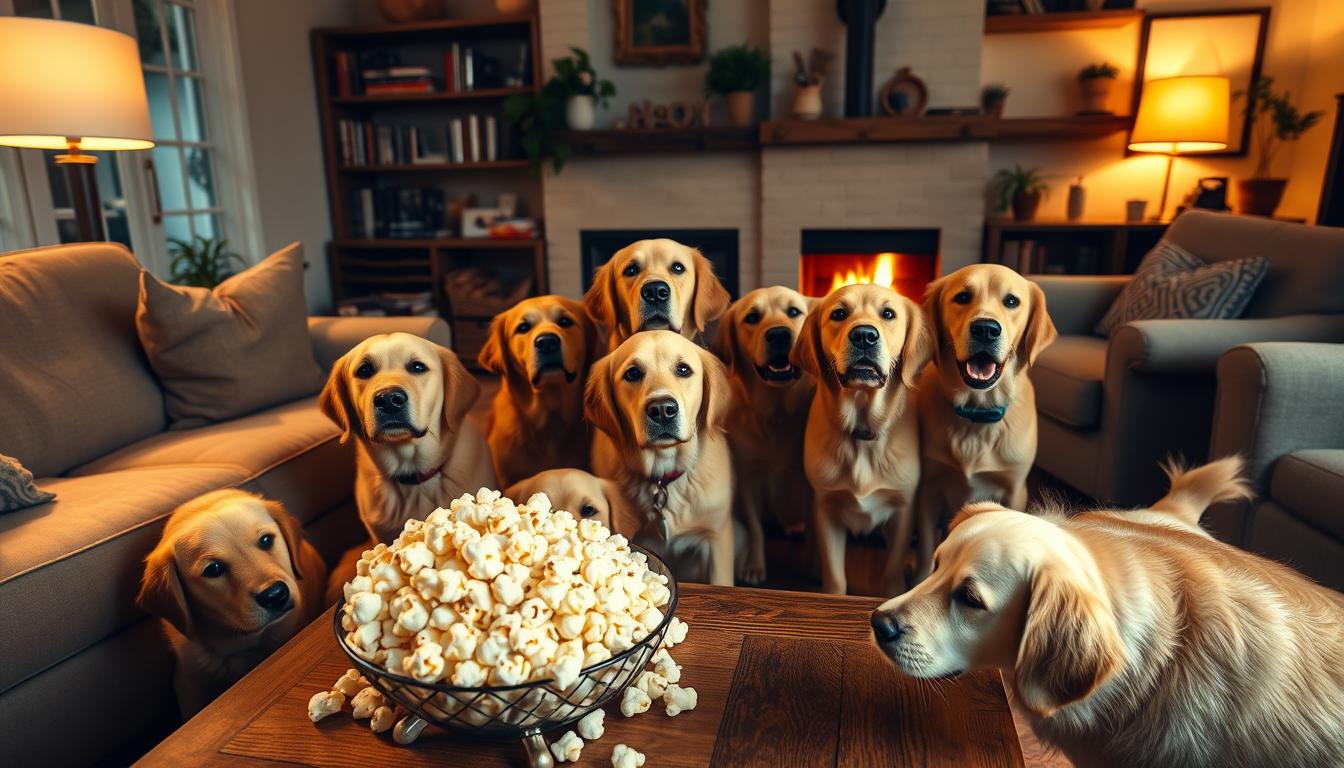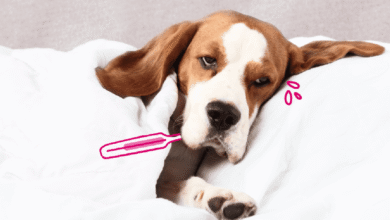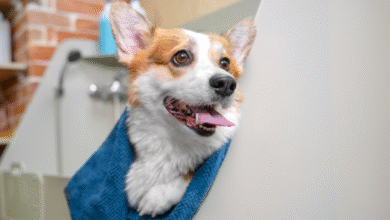Can Dogs Eat Popcorn? What You Need to Know
If you’re a dog owner, you’re always looking for healthy treats. But, you might wonder if snacking on popcorn is safe for your dog.

Popcorn might seem like a harmless snack. But, there are important things to think about before giving it to your dog. In this article, we’ll look at the good and bad of popcorn for dogs. This way, you can make smart choices about their snacks.
Key Takeaways
- Understand the safety of feeding popcorn to dogs
- Learn about the nutritional aspects of popcorn for dogs
- Discover the possible dangers of giving popcorn to dogs
- Get tips on how to safely share popcorn with your dog
- Find out which types of popcorn are safe or not safe for dogs
The Relationship Between Dogs and Human Foods
Dogs love human food, and it’s important to understand why. They often want to eat what their owners are having. This can create a tricky situation at home.
Why Dogs Are Attracted to Our Snacks
Dogs like human snacks for many reasons. One big reason is social bonding. When they share food, it makes them feel closer to their owners. Dogs are social and enjoy being with their people.
They also find the smell and taste of human food irresistible. Foods high in fat or salt are often the most appealing.
Dogs are naturally curious. Seeing their owners eat a snack makes them curious. They might try some for themselves.
General Guidelines for Sharing Food with Your Dog
It’s tempting to share snacks with your dog, but be careful. Not all human foods are safe for them. Knowing what you can share is key.
| Food Type | Safety for Dogs | Precautions |
|---|---|---|
| Plain Popcorn | Generally Safe | Remove unpopped kernels |
| Flavored Popcorn | Not Recommended | Avoid due to additives |
| Other Human Snacks | Varies | Research before sharing |
Always think about your dog’s health when sharing food. If you’re not sure about a food, talk to a vet.
The Australian Cattle Dog: Your Loyal Companion
Can Dogs Eat Popcorn? The Basic Answer
Thinking about giving your dog popcorn? It’s important to know the basics first. Popcorn is fun for people, but it’s not always good for dogs.
Plain Popcorn vs. Flavored Varieties
There’s a big difference between plain and flavored popcorn for dogs. Plain, air-popped popcorn is usually okay in small amounts. But, flavored popcorn can be bad because of artificial additives or high salt and butter.
Flavored popcorn might have things like onion or garlic powder that are bad for dogs. So, if you want to give your dog popcorn, make sure it’s plain and doesn’t have any extra stuff.
| Popcorn Type | Safety for Dogs | Precautions |
|---|---|---|
| Plain, Air-Popped | Generally Safe | Moderation is key |
| Flavored or Microwave | Potentially Harmful | Avoid additives and chemicals |
Portion Control Considerations
Even safe popcorn needs careful portion control. Dogs need different food than people, and treats should be only 10% of their daily calories.
Small dogs might only need a few popcorn pieces, while bigger dogs can have more. But, always watch how your dog reacts to popcorn and adjust as needed.
Nutritional Profile of Popcorn for Dogs
Popcorn can be a healthy snack for dogs, but knowing what’s in it is key. Plain popcorn, without butter, salt, or artificial flavors, is a whole grain. It has many good nutrients.
Beneficial Nutrients in Plain Popcorn
Plain popcorn is rich in fiber, which helps with digestion. It also has antioxidants that fight cell damage. Plus, it’s packed with magnesium and phosphorus, important for dogs’ health.
| Nutrient | Benefit | Amount per Serving |
|---|---|---|
| Fiber | Aids in digestion | 3g |
| Magnesium | Supports muscle and nerve function | 30mg |
| Phosphorus | Essential for bone health | 80mg |
How Popcorn Fits into a Dog’s Dietary Needs
Popcorn can be a nutritious snack, but it’s part of a bigger picture. Dogs need proteins, fats, carbs, vitamins, and minerals. Popcorn adds to the carb part but shouldn’t replace their main food.
To safely add popcorn to your dog’s snacks, make sure it’s plain and air-popped. Don’t add bad toppings, and only give a little to avoid overfeeding. A small popcorn treat can be fun and healthy for dogs, as long as they’re not allergic to grains.
Potential Health Benefits of Popcorn for Dogs
Popcorn is a tasty snack for humans and can be good for dogs too. As a dog owner, finding healthy treats is important. Plain, air-popped popcorn is a great option, providing some nutritional benefits.
Fiber Content and Digestive Health
Plain popcorn is high in fiber. Fiber helps keep your dog’s digestion healthy. It keeps bowel movements regular and prevents constipation. It also helps with weight management and feeling full.
But, adding fiber slowly to your dog’s diet is key. This prevents any upset stomach.
Low-Calorie Treat Option
Popcorn is low in calories. It’s a better choice than high-calorie treats that can lead to weight gain. For dogs on a diet or needing to lose weight, popcorn is a tasty snack. Just remember to include popcorn calories in your dog’s daily diet for balance.
In moderation, plain popcorn is a healthy treat for dogs. It supports digestive health and is a low-calorie snack option.
Risks and Dangers of Feeding Popcorn to Dogs
Feeding popcorn to dogs can be risky. An occasional piece might not hurt, but there are dangers. These dangers come from the snack itself.
Choking Hazards: Kernels and Unpopped Pieces
One big risk is choking on kernels and unpopped pieces. Dogs, like smaller breeds, can easily inhale these hard bits. They can get stuck in their throat or stomach. To avoid this, make sure the popcorn is fully popped and kernel-free.
Harmful Additives: Salt, Butter, and Artificial Flavors
Many popcorns have additives that are bad for dogs. Salt can cause sodium poisoning, leading to vomiting and diarrhea. Butter and fats can cause pancreatitis, a painful condition. Artificial flavors and preservatives can also harm dogs.
Digestive Issues and Allergic Reactions
Some dogs may have digestive problems or allergies to popcorn. The high fiber can upset their stomachs. They might also be allergic to certain ingredients. Watch how your dog reacts and talk to a vet if they show signs of trouble.
Knowing these risks helps you decide if popcorn is safe for your dog. It’s all about keeping them safe and healthy.
Different Types of Popcorn and Their Safety for Dogs
Not all popcorn is safe for dogs. The way it’s made and what’s in it matters a lot. This affects how safe it is for your furry friend.
Air-Popped Plain Popcorn
Air-popped plain popcorn is usually the safest for dogs. It doesn’t have oils, salts, or flavorings that can harm them. This type is low in calories and rich in fiber, making it a good treat in small amounts.

Microwave Popcorn Concerns
Microwave popcorn is risky. The bags might have chemicals like PFOA, which is bad for dogs. It also has artificial flavorings and lots of salt, which aren’t good for dogs.
Movie Theater and Pre-Packaged Popcorn
Movie theater and pre-packaged popcorn are the least safe for dogs. They have a lot of butter, salt, and seasonings that can upset a dog’s stomach. Some of these additives can even be toxic.
| Type of Popcorn | Safety for Dogs | Key Concerns |
|---|---|---|
| Air-Popped Plain | Generally Safe | None, if plain |
| Microwave | Not Recommended | PFOA, artificial flavorings, salt |
| Movie Theater/Pre-Packaged | Dangerous | Butter, salt, toxic additives |
Knowing the differences helps you choose safe popcorn for your dog. This ensures they stay healthy and happy.
How to Safely Prepare and Serve Popcorn to Your Dog
Making dog-friendly popcorn is easy with the right steps. To make sure your dog can enjoy it safely, prepare and serve it correctly. Safe popcorn for dogs means avoiding harmful additives and taking the right precautions.
Step-by-Step Guide to Dog-Friendly Popcorn
To make popcorn for pets, start with plain, air-popped popcorn. Stay away from microwave or pre-packaged popcorn, as they often have salt, butter, or artificial flavors. Here’s a simple guide:
- Use a pot or an air popper to make the popcorn.
- Ensure the popcorn is fully popped to avoid choking hazards.
- Let it cool completely before serving it to your dog.
Appropriate Serving Sizes by Dog Weight
The amount of popcorn you can safely give your dog depends on their weight. Smaller dogs (under 20 lbs) can have about 1/4 cup. Medium dogs (21-50 lbs) can have 1/2 cup. Larger dogs (over 50 lbs) can have up to 1 cup as an occasional treat.
Breed-Specific Considerations
Some breeds may have specific needs or restrictions. For example, brachycephalic breeds (like Pugs or Bulldogs) might have trouble eating popcorn because of their facial structure. Always consider your dog’s individual needs and consult with your veterinarian if you’re unsure.
What to Do If Your Dog Eats Unsafe Popcorn
If your dog eats unsafe popcorn, it’s important to know what to do. The first thing is to stay calm and quickly figure out what happened.
Signs of Popcorn-Related Distress
Your dog might show signs of distress after eating unsafe popcorn. These signs include:
- Vomiting or diarrhea
- Abdominal pain or discomfort
- Lethargy or unusual behavior
- Choking or gagging on kernels
Watching your dog closely is key in the hours after they eat popcorn. If you see any of these signs, act fast.

When to Contact Your Veterinarian
If your dog shows distress after eating popcorn, call your vet. Be ready to share:
| Information to Provide | Details |
|---|---|
| The amount of popcorn consumed | Estimate how much popcorn your dog ate |
| Type of popcorn | Whether it was flavored, contained additives, or was plain |
| Time of consumption | When your dog ate the popcorn |
Your veterinarian will give advice based on your situation. They might suggest immediate care or watching your dog at home.
In short, if your dog eats unsafe popcorn, watch for signs of distress. Be ready to call your vet with all the details. This can help keep your dog safe and healthy.
Conclusion: Making the Right Snack Choices for Your Canine Companion
As a dog owner, it’s key to choose wisely when sharing human foods with your pet. Knowing about popcorn safety for dogs is vital for a healthy snack time. This ensures your furry friend enjoys their treats.
Now, you know plain, air-popped popcorn is safe and somewhat healthy for dogs in small amounts. But, it’s also important to watch out for flavored or additive-laden popcorn. These can be risky.
Always check the ingredients and how the popcorn is made before giving it to your dog. If unsure, it’s safer to pick a different snack. Your dog’s health is more important than any treat.
By being careful with popcorn safety for dogs and making smart choices, you can share this tasty snack. This way, you keep your dog happy and healthy.
FAQ
Is it safe for dogs to eat popcorn?
Yes, dogs can safely eat plain, air-popped popcorn in small amounts. But, avoid flavored or topped varieties as they can be harmful.
What are the risks of feeding popcorn to dogs?
Feeding popcorn to dogs can lead to choking from kernels or unpopped pieces. It can also cause digestive issues from eating too much or additives like salt and butter. Plus, there’s a risk of allergic reactions.
Can dogs eat microwave popcorn?
Dogs can technically eat microwave popcorn, but it’s not recommended. It may have harmful additives and can burn your dog’s mouth.
How should I prepare popcorn for my dog?
To make popcorn safe for dogs, air-pop kernels without salt, butter, or seasonings. Let it cool before giving it to your dog.
What is a safe serving size of popcorn for my dog?
The right amount of popcorn depends on your dog’s size. Small dogs can have a few pieces, while bigger dogs can have a handful. Always introduce new foods slowly.
Are there any health benefits to feeding popcorn to dogs?
Plain popcorn can be a low-calorie treat and is rich in fiber. This can help with digestion. But, it should not replace a balanced diet.
What should I do if my dog eats flavored or topped popcorn?
If your dog eats flavored or topped popcorn, watch them for signs of distress. Look for vomiting, diarrhea, or lethargy. Call your vet if you see any bad reactions.
Can popcorn be a regular part of my dog’s diet?
No, popcorn should not be a regular part of your dog’s diet. While plain popcorn can be an occasional treat, a balanced dog food should be their main diet.
Are there breed-specific considerations for feeding popcorn to dogs?
Yes, some breeds are more at risk for choking or digestive issues. Small breeds or those with dental problems need extra care when giving popcorn.
How can I tell if my dog is having an allergic reaction to popcorn?
Signs of an allergic reaction include itching, swelling, vomiting, diarrhea, or trouble breathing. If you think your dog is having an allergic reaction, call your vet right away.




